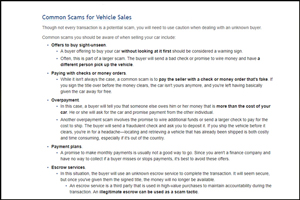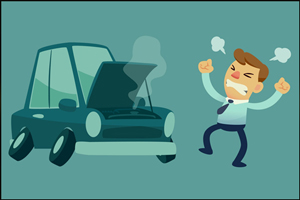Buying Car Scams
Vehicle Will Never Arrive After the Successful Payment:
Life tends to feel safe at least until you've been scammed. They prey on everyday people, using fake messages to quickly snatch away their hard earned money. At first, they seems genuine, often following what looks like a normal, trustworthy process to win your trust. But once they get their hands in your money, their true intentions come to light. There's no shortage of scam types out there, and new ones are popping up all the time. These Scammers often use methods that seem official like emails, texts, or even package deliveries to make their approach. And once an unsuspecting person responds, they strike then vanish with the money, and leave the victim behind.
If you're thinking about buying a new car from a someone you don't know, it's really important to make sure the seller is reliable. Be patient and think it through. Take your time to look into their background and confirm they're the real deal before making any decisions. Have they sold cars before? Do they have a proper solid reputation?Verify that their contact information is correct and that they have a valid physical address. If you haven't met the seller in person, it's best to arrange a face-to-face meeting before parting with any money. At the very least, speak with the seller over the phone to get the details of who they are. If they're based in another country, try to get help from someone you know in that area who can inspect the car in person for you. Don't depend entirely on emails read through their messages carefully, more than once if needed, and watch for anything that feels off. If something seems strange or unclear, trust your instincts. It's better to walk away than to take a chance and lose your money. And if you ever receive an email or offer that seems suspicious, report it right away to your local cyber crime authorities. Taking action early can save you from a regret later.
Purchasing a vehicle is fun, but it is also a time when you must be careful. Others attempt to take advantage of others by performing car scams that will cost you a significant amount of money and earn you legal issues. Whether you are purchasing from an individual or over the Internet, here are some popular car scams and how to avoid them:
1. Scammers often post cars online at very tempting prices to grab your attention. The photos may look great, and the deal might seem too good to pass up. But when you contact the seller, the car either doesn't exist, or it's in much worse shape than advertised. In some cases, they'll ask for a deposit to hold the car for you — and once you send the money, they stop responding and disappear.
Avoidance: Always verify the legitimacy of online listings. Request detailed information, ask for additional photos, and consider using reputable online marketplaces or dealerships.
2. Some scammers try to sell cars that were badly damaged in the past like those involved in accidents, floods, or even stolen but they hide this by changing or washing the title to make it look clean. They do this to trick buyers into thinking the car is in better shape than it really is.
Avoidance: Obtain a vehicle history report (e.g., Carfax) and have the vehicle inspected by a trusted mechanic before purchase. Verify the title and registration details with your local DMV.
3. Over payment Scams: In this scam, the buyer offers to pay more than the price you agreed on often by check. Then, they ask you to send back the extra money. But here's the trick, the check they gave you is fake. By the time the bank realizes it and bounces the check, you've already sent them real money and it's gone for good.
Avoidance: Be cautious when dealing with over payments. Verify the payment method, wait for funds to clear before transferring a refund, and consider using secure payment methods like bank wire transfers.
4. Escrow Scams: Some scammers will suggest using an escrow service which is a third party to hold the money safely to make you feel secure. But the service they recommend is fake and actually controlled by them. Once you send the money, the Escrow service will disappear and so does your cash.
Avoidance: Use reputable and established escrow services that both parties agree upon. Verify the legitimacy of the chosen service independently.
5. In this scam, the seller advertises a nice-looking car to attract you. But when you go to see it, they tell you it's already sold or just got taken, and then try to sell you a different car usually one that's older, damaged, or not worth the price. They count on you being eager and settling for whatever is available.
Avoidance: Carefully inspect the vehicle and its documentation to ensure it matches the advertised details. Don't settle for a different vehicle unless you agree to the change in terms.
6. Title Skipping: No Title Transfer: Scammers may avoid transferring the title into your name, leaving you responsible for any outstanding debts or issues associated with the vehicle.
Avoidance: Ensure that the title transfer is completed correctly and that you have all necessary documentation. Verify the title's authenticity and contact your local DMV for guidance.
7. Curbstoning: Unlicensed Sellers: Some individuals pose as private sellers but are actually unlicensed dealers. They may sell vehicles with hidden problems or forged documents.
Avoidance: Research the seller's background, check for any suspicious patterns of car sales, and be cautious if the seller avoids providing their real identity or address.
When buying a car, it's crucial to conduct thorough research, inspect the vehicle carefully, verify documentation, and use secure payment methods. If something doesn't seem right or if you encounter any red flags during the buying process, trust your instincts and consider seeking advice from a trusted mechanic, legal professional, or consumer protection agency.









